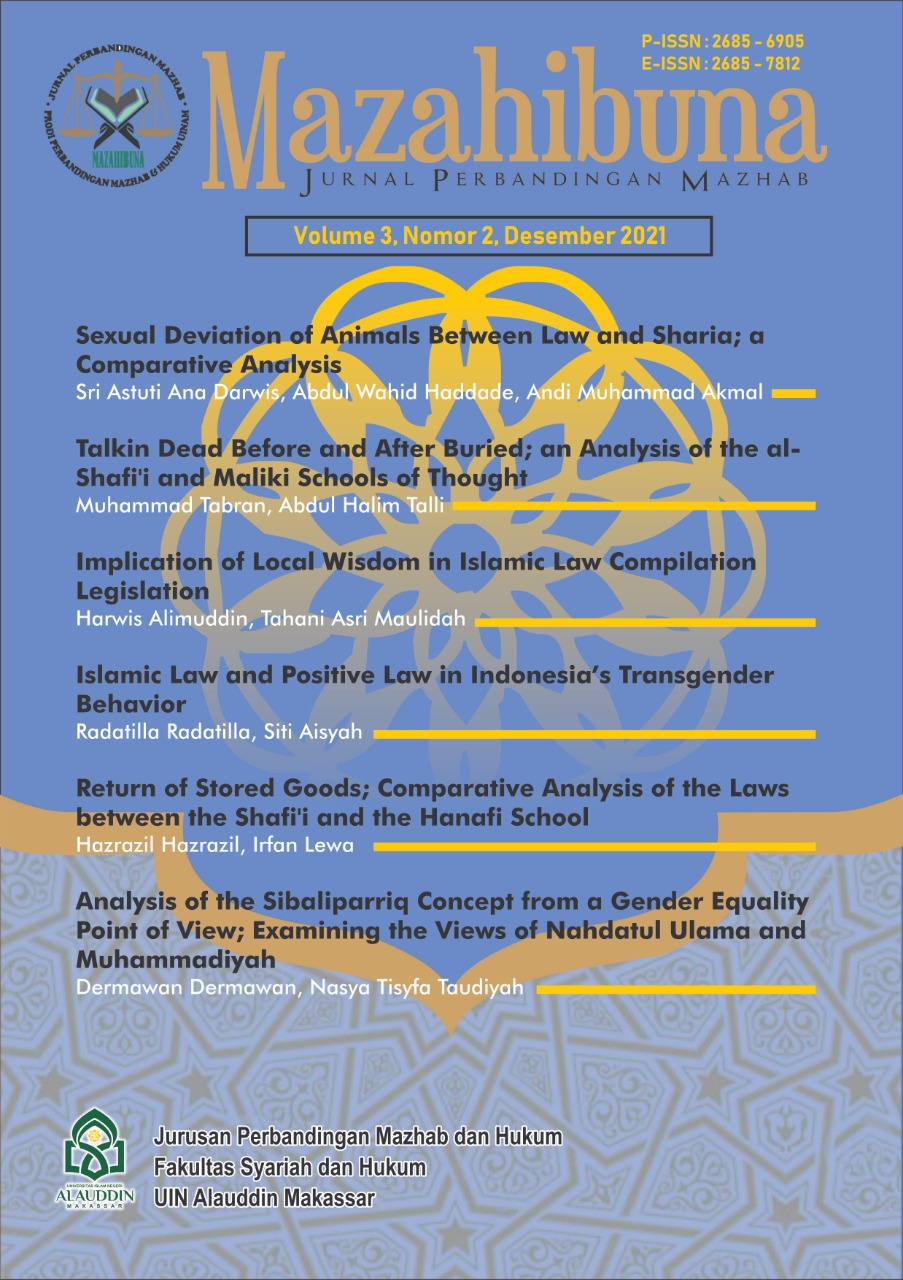Islamic Law and Positive Law in Indonesia’s Transgender Behavior
Abstrak
Transgender Issues in Islamic Law and Positive Law are the focus of this article. A multidisciplinary technique, specifically a normative-juridical approach, is used to address these questions and analyze descriptive data. This study is classified information. Analyzing representative literature and making sure its content is relevant to the issues being debated are all part of the process of conducting this form of library research. Researchers concluded that transgender is the transfer of behavior between men and women that is socially manufactured, essential differences between men and women that are not natural or decided by Allah SWT, but rather the result of the actions of both men and women themselves. It's still up for dispute whether or not there are transgender people in Indonesia. They can do whatever they want as long as the organization accepts that transgender individuals have the same human rights as everyone else. Changing one's gender is not a mental illness. Transgender people, on the other hand, are particularly vulnerable to mental health issues brought on by internal struggle and external pressure
Referensi
Arianto, and Rido Triawan. Jadi Kau Tak Bersalah? Studi Kasus Diskriminasi Dan Kekerasan Terhadap LGBT. Jakarta: Citra Grafika, 2008.
Bakry, Muammar, Abdul Syatar, Islamul Haq, Chaerul Mundzir, Muhammad Arif, and Muhammad Majdy Amiruddin. “Arguing Islamophobia during COVID-19 Outbreaks: A Consideration Using Khuṣūṣ Al-Balwᾱ.” International Journal of Criminology and Sociology 9, no. Desember (2020): 2757–65. doi:10.6000/1929-4409.2020.09.340.
Kementerian Agama RI. Al-Qur’an Dan Terjemahannya. Jakarta: Lajnah Pentashihan Mushaf Al-Qur’an Badan Litbang dan Diklat Kementerian Agama RI, 2019. doi:10.16309/j.cnki.issn.1007-1776.2003.03.004.
Ma’luf, Luis. Al-Munjid Fi Al-Luyah Wa Al Adab Wa Al A’lam. Cairo: Maktabah Al Syarqiyyah, 1986.
Mahjuddin. Masailul Fiqhiyah Berbagai Kasus Yang Dihadapi Hukum Islam Masa Kini. Jakarta: Kalam Mulia, 2005.
Muladi. Hak Asasi Manusia: Hakekat, Konsep Dan Implikasinya Dalam Perspektif Hukum Masyarakat. Bandung: Refika Aditama, 2009.
Mustafa, Adriana. “Perilaku Seksual Transgender (Studi Komporatif Hak Asasi Manusia Antara Perspektif The Universal Declaration of Human Righ The Cairo Declaration of Human Right).” Al-Risalah: Jurnal Ilmu Syariah Dan Hukum 19, no. 2 (2019): 254.
Musyahid, Achmad. “Kesetaraan Gender Pespektif Filsafat Hukum Islam.” Jurnal Sipakalebbi 1, no. 1 (2013): 176.
Partanto, Pius A., and M.Dahlan Al-Barry. Kamus Ilmiah Populer. Surabaya: Arkola, n.d.
Redaksi Sinar Grafika. Undang-Undang HAM 1999. Jakarta: Sinar Grafika, 2001.
Rukmana, Nana. Etika Kepemimpinan Perspektif Agama Dan Moral. Bandung: Alfabeta, 2007.
Rumata, Vience Mutiara. “Lesbi, Gay, Biseksual, Dan Transgender Dalam Bingkai Kajian Media Dan Komunikasi: Sebuah Kajian Literatur Sistematis.” Diakom : Jurnal Media Dan Komunikasi 2, no. 2 (2020): 168–77. doi:10.17933/diakom.v2i2.64.
Santoso, Meilanny Budiarto. “LGBT Dalam Perspektif Hak Asasi Manusia.” Jurnal Share Social Work 6, no. 2 (2016): 154. doi:https://doi.org/10.24198/share.v6i2.13206.
Syatar, Abdul. “Konsep Masyaqqah Perspektif Hukum Islam; Implementasi Terhadap Isu-Isu Fikih Kontemporer.” UIN Alauddin Makassar, 2012. http://repositori.uin-alauddin.ac.id/id/eprint/6009.
Tua, Eko Mulya. “Pembinaan Terhadap Kaum Lesbian, Gay, Bisexual, Transgender (Sebuah Konsep Pembinaan Warga Gereja).” In Prosiding Seminar Nasional Pendidikan Agama Kristen Sekolah Tinggi Teologi Simpson Nasional Pendidikan Agama Kristen Sekolah Tinggi Teologi Simpson Ungaran, 58–67, 2016.
Wijaya, Abdi. “Sejarah Kedudukan Hukum Islam Dalm Konstitusi-Konstitusi Indonesia (Sistem Ketatanegaraan Indonesia).” Jurnal Hukum Pidana Dan Ketatanegaraan 7, no. 2 (2018): 263.

This work is licensed under a Creative Commons Attribution 4.0 International License.
Authors who publish with Mazahibuna: Jurnal Perbandingan Mazhab agree to the following terms:
- Authors retain copyright and grant the Mazahibuna: Jurnal Perbandingan Mazhab right of first publication with the work simultaneously licensed under Creative Commons Attribution License (CC BY 4.0) that allows others to share the work with an acknowledgment of the work's authorship and initial publication in this journal.
- Authors can enter into separate, additional contractual arrangements for the non-exclusive distribution of the published version of the work (e.g., post it to an institutional repository or edit it in a book), with an acknowledgment of its initial publication in this journal.
- Authors are permitted and encouraged to post their work online (e.g., in institutional repositories or on their website) before and during the submission process, as it can lead to productive exchanges, as well as earlier and greater citation of published work.

